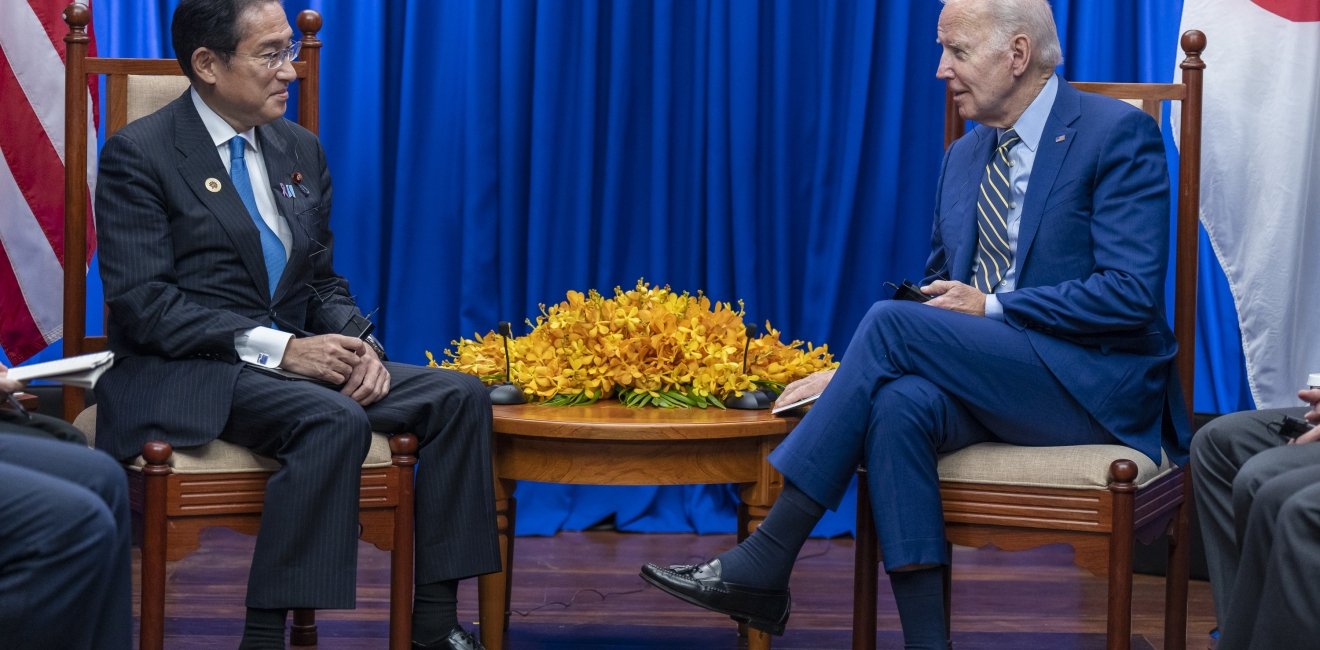
A blog of the Indo-Pacific Program
The summit meeting between Japanese Prime Minister Fumio Kishida and President Biden in April comes at a time when US-Japan relations are at their strongest. Both Washington and Tokyo have highlighted shared interests between the two countries at a time of upheaval across the Indo-Pacific and worldwide. But while there may be no pressing source of bilateral conflict to resolve, expectations for Japan to expand its role as a global stabilizer will not necessarily be smooth sailing.
Kishida’s official visit to Washington from April 10, which includes a speech before Congress and a state dinner at the White House, follows visits by Australian Prime Minister Anthony Albanese and Indian Prime Minister Narendra Modi in 2023. The fact that the White House has made efforts to invite leaders from the countries that make up the Quad as well South Korea over the past 12 months with great pomp and circumstance illustrates US commitment to strengthening partnerships across the Indo-Pacific. The need to revise the hub-and-spokes security system with the United States at the center has gained greater urgency in recent years amid ongoing tensions in the Middle East and no end in sight to the war in Ukraine on the one hand, and China’s continued military expansion and visions for a shift in the international order on the other.
It was under Prime Minister Shinzo Abe’s first administration in 2007 that Japan first put forward its vision for a Free and Open Indo-Pacific. Since then, the concept of a rules-based regional order has not only expanded but has also been adopted by the United States and other key nations including South Korea, Australia, France, Britain, and Germany as well. Under Kishida, the concept has been expanded still further to include the Global South to promote a rules-based international order which will be reflected in the trilateral summit meeting that will take place at the White House together with Filipino President Ferdinand Marcos Jr. Advancing a more inclusive approach to growth will be key to secure support from Southeast Asia in particular for the rules-based order that both Tokyo and Washington are advocating.
It is, however, on the security front that US expectations for Japan will be the highest. Since Kishida took office in 2021, Japan has unveiled a national security strategy that is committed to raising its defense spending to 2 percent of its GDP and pushing the boundaries of Japanese commitment for regional security. One focus area at the summit meeting will be to promote closer cooperation in the defense industrial base through joint development of military equipment and new technologies. Meanwhile, Deputy Secretary of State Kurt Campbell stated at a public forum ahead of the summit that the US-Australia-UK trilateral AUKUS security partnership could be expanded to potentially include Japan. Yet, as the momentum builds to strengthen and grow both AUKUS and the Quad, political uncertainties cast a shadow over steady development.
For one, Japan’s ruling Liberal Democratic Party led by Kishida is facing its biggest political challenge on corruption charges in recent decades. With the future leadership of the LDP on shaky ground, Japanese support for enhanced engagement may face challenges in moving forward. Another source of concern for Japanese policymakers and business executives alike is the impasse over Nippon Steel’s $14.1 billion deal to buy out Pittsburgh-based US Steel. While the Japanese prime minister has stated the issue would not be raised at the summit given that it is a matter for two private companies to resolve, the White House stated in March that US Steel should remain a US-owned companies powered by American workers. Whatever the final outcome of the deal, the dispute has put a damper on Japanese confidence in the United States as an economy open for business with trusted partners.
Meanwhile, the divide between bilateral efforts to further multilateral security networks and partnerships to secure economic expansion continues to grow. In an interview with Japanese financial daily Nikkei, Kishida said that decarbonization and sustainable supply chain development will be key issues to be addressed by the two leaders, what South and Southeast Asia in particular will be seeking is more investments in critical infrastructure and opportunities to move up the value chain amid seismic shifts in the economic landscape. As both Washington and Tokyo present a united front to promote a rules-based international order, coordinated efforts to create advance economic opportunities across the Indo-Pacific will be critical to enhance commitment to the vision of the Indo-Pacific.
The views expressed are the author's alone, and do not represent the views of the US Government or the Wilson Center. Copyright 2024, Indo-Pacific Program. All rights reserved.
Author


Indo-Pacific Program
The Indo-Pacific Program promotes policy debate and intellectual discussions on US interests in the Asia-Pacific as well as political, economic, security, and social issues relating to the world’s most populous and economically dynamic region. Read more





